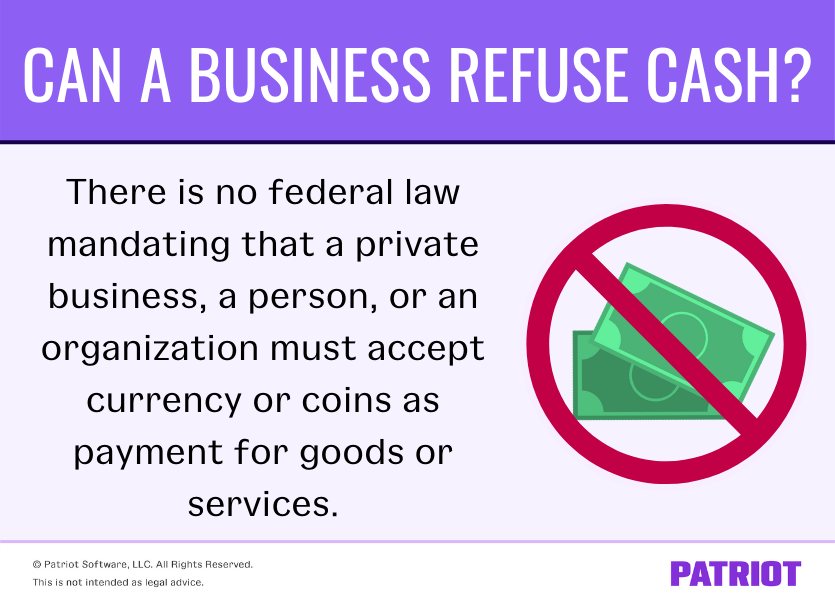In this day and age, people are pushing cash to the side and paying with plastic. In fact, one study found that 80% of people prefer to use card payments over cash. But, just because plastic is dominating does not mean cash is obsolete. Many people still prefer to pay with cash. And in some cases, it can be easier to deal with cash than cards. But, can a business refuse cash? Is it legal to only accept credit cards and other non-cash payment options? Read on to get the scoop.
Can a business refuse cash?
Maybe you’ve noticed some small businesses in your area posting signs about not accepting cash. Or, maybe you’re thinking about going cashless yourself.
Whatever the case may be, you’re likely wondering, Is it legal to not accept cash? Well, let’s find out.
According to Section 31 U.S.C. 5103 entitled “Legal Tender,” “United States coins and currency [including Federal Reserve notes and circulating notes of Federal Reserve Banks and national banks] are legal tender for all debts, public charges, taxes, and dues.”
So … what exactly does that mean, and what does it have to do with accepting cash? In layman’s terms, it means that U.S. currency is accepted as legal tender and that cash holds the same value across the country.
It also means that cash is a legal tender for all public and private debts. Federal law makes U.S. currency a legal tender for paying debts. And as a small business owner, you must accept dollars for your products or services. However, it doesn’t mean it has to be paper dollars. You can accept electronic dollars as payment, too.
Can a business refuse to accept cash under federal law?
According to the Federal Reserve System, there is no federal statute mandating that a private business, a person, or an organization must accept currency or coins as payment for goods or services.
The Federal Reserve System also states that businesses are free to develop their own policies on whether to accept cash unless there is a state law that says otherwise.
In short, there is no federal law that requires private businesses to accept cash payments from customers.
The bottom line is this:
- No federal law requires private businesses to accept cash
- You can accept payments in whatever form you’d like
Is it legal to not accept cash according to state laws?
Your state or locality may require your business to accept cash payments. State laws on cash acceptance policies trump federal rules.
If your state has a law requiring you to accept cash payments, you must follow the rules. If you fail to comply with your state or local cash acceptance rules, you could face penalties and fees.
Some states limit restrictions businesses can impose. For example, many states require private impound lots to accept cash from individuals trying to retrieve their vehicles.
Check with your state or locality before refusing cash at your small business.

Refusing cash during COVID-19
Because cash passes between so many hands, it’s no secret that businesses big and small have been leery about accepting cash during COVID-19.
Many businesses are refusing cash during COVID-19 as a precaution to protect both employees and customers. And, some businesses aren’t accepting cash due to the nationwide coin shortage.
So, is it legal for businesses to not accept cash during COVID-19? The short answer: yes. As mentioned, there is no federal law that mandates private businesses to accept cash as a form of payment. Ultimately, it’s up to the business to decide whether or not they want to accept cash payments (unless there is a state or local law that says otherwise).
Pros and cons of refusing cash
As a small business owner, you can enforce a payment policy that fits your needs. You might accept cash but have some restrictions (e.g., no bills over $20). Or, you might opt to refuse cash. Before you make any decisions, check out the pros and cons of accepting cash below.
Pros:
- Less chance of theft
- Saves time (e.g., don’t have to deposit cash)
- Less chance of accepting counterfeit bills
Cons:
- Narrows customer reach
- Prevents instant access to cash
- More fees for other payment methods
Refusing cash? Follow these 3 tips
Thinking about refusing cash altogether at your business? If so, check out these three tips.
1. Post your policy
If you plan on not accepting cash at your business, post your policy and make sure it’s visible to your customers.
Post your policy at your front door, on your website, at your point of sale, and anywhere else customers will see before making a purchase. On your policy, include the types of payments you accept (e.g., checks, credit cards, etc.). You may also include the reason for your policy (e.g., “Due to COVID-19…”).
2. Offer a variety of payment options
If you’re not accepting cash from customers, offer a variety of payment options to make it convenient for customers to pay you without cash. Consider accepting:
- Credit cards
- Debit cards
- Checks
- Mobile wallet payments
- Gift cards
Make sure you also have a convenient payment process. Check that your payment processing equipment is up-to-date and working properly.
3. Look into costs
Offering other payment options, such as credit cards, can be costly for small businesses.
Credit card processing fees can be expensive. Typically, you pay a credit card merchant a percentage of each sale made with a credit card. You might also have to pay for setup and equipment.
Before offering other payment methods, do your due diligence and find out what kind of costs and fees are associated with them.
Accepting cash? Keep these things in mind…
Planning on accepting cash payments from your customers? Great! Keep these three things in the back of your mind.
1. Record all cash transactions
As a business owner, you must keep records of every transaction, including cash sales. If you accept paper bills from customers, treat cash transactions like you would any other type of transaction.
For every cash sale you have, make a general ledger entry in your books. Record what the sale was for, the date of the transaction, and the amount. Keep supporting documents like receipts to back up your records in case there are any discrepancies.
Record your cash transactions on a regular basis to keep your books up-to-date and to catch mistakes early on.
2. Make cash deposits
Leaving too much cash in your register(s) can be dangerous. Instead of letting cash pile up in your registers, make deposits.
To make cash deposits, open a business bank account to exclusively use for company transactions. At the end of the period (e.g., day, week, etc.), deposit the cash your business earned from sales.
A business bank account helps keep your cash secure. Not to mention, it gives you an extra record of sales.
In addition to making frequent deposits, you should also have a secure way to store your cash until you can make said deposits. Consider investing in a safe to store excess cash from the register until you can deposit funds. And, only allow certain employees access to the safe (e.g., managers).
3. Avoid accepting large bills
To protect your business from counterfeit bills, avoid accepting larger bills (e.g., $50 or $100). Large bills are the most common bills to be counterfeited.
To steer clear of unknowingly accepting counterfeit bills, consider creating a policy about the type of bills your business will accept. For example, maybe you will only accept $1, $5, $10, and $20 bills.
In addition to establishing a policy, you can check bills with a special counterfeit money detector pen. These pens are inexpensive and show you whether or not a bill is fake.
Learn how to tell if money is fake. Then, you can also train your team to be on the lookout for suspicious-looking bills (e.g., check for watermarks) and what to do if they receive one.
Accepting large bills can also cause issues when it comes to giving change back to customers. If you accept large bills, be prepared to provide customers with the proper change.
Need a simple way to keep track of your business’s transactions? Patriot’s online accounting software is affordable and easy-to-use. Plus, we offer free, USA-based support. Try it for free today!
This article has been updated from its original publication date of August 8, 2017.
This is not intended as legal advice; for more information, please click here.
